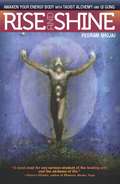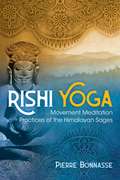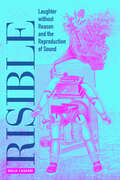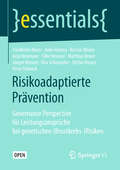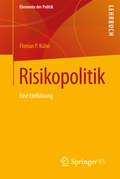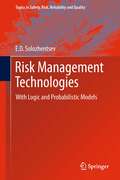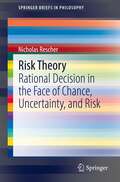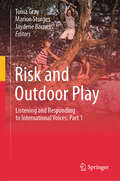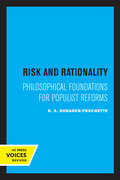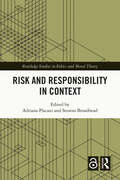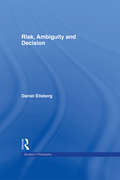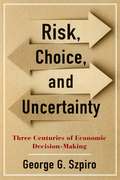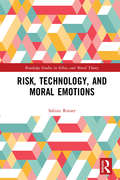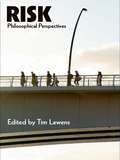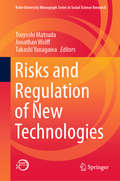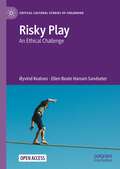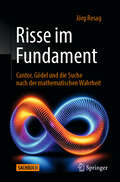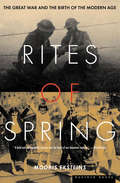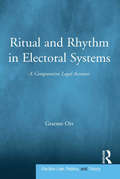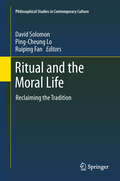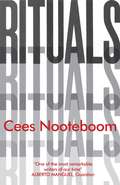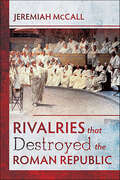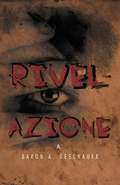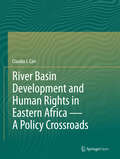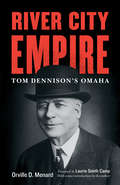- Table View
- List View
Rise and Shine
by Pedram Shojai"Pedram Shojai is the master teacher and guide for movement, awareness, and exploration of the harmony of energy."-Don Campbell, author of The Roar of Silence and The Mozart EffectMillions of Americans are joining a holistic health revolution in which yoga, natural foods, and traditional Chinese medicine are providing potent healing alternatives to costly and often debilitating prescriptions of surgery and pharmacology.As a renowned acupuncturist, master herbalist, wellness consultant, and lifelong student of various alchemical traditions, Pedram Shojai is the first author to fuse these energetic practices with an alchemical perspective, resulting in a powerful daily practice that not only heals and invigorates your body, but expands your awareness and personal power.Rise and Shine begins with the remarkable story of Shojai's personal transformations that led him into him to his unique synthesis of spiritual and physical purification practices. Shojai then shows readers ways to activate and balance the "Subtle Body" or "Light Body"-the energy meridians of acupuncture and other energy channels. He incorporates meditation and synthesized forms of Qi Gong (Chinese energy yoga) from Taoist, Buddhist, and eastern medical traditions to teach modern audiences simple, profound methods to find balance, energy, and peace in today's world.Pedram Shojai has worked with individuals, companies, and groups for several years teaching transformative practice and meditation. He has a three DVD set out titled The Alchemy of Qi Gong (Sacred Mysteries) that recently won acclaim from The Coalition of Visionary Resources awards.
Rishi Yoga: Movement Meditation Practices of the Himalayan Sages
by Pierre BonnasseA step-by-step guide to a powerful yet simple practice to make every moment an act of meditation and connect to the joy within • Details the simple practices of Rishi Yoga: easy physical movements, done slowly and with full awareness, combined with breathing exercises, sensory perception, concentration, and meditation • Explains how the practices work progressively to allow you to tune in to your body and cellular memory, facilitate concentration, and cultivate self-awareness • Reveals how to integrate Rishi Yoga into daily life to make every moment an act of meditation and access the peace and joy inherent within each of us In this detailed guide, yoga and meditation teacher Pierre Bonnasse reveals the simple movement, breathing, and awareness techniques of the Rishi Yoga tradition, passed down through generations of yogis in the Himalayas. He shows how to integrate Rishi Yoga into daily life for discovering and recognizing the Universal Self, or Pure Awareness, and unveiling the peace and joy inherent in each of us. The author begins by detailing the foundational practices of Rishi Yoga: easy physical movements, done slowly and with full awareness, combined with breathing exercises, sensory perception, and concentration. These moving-meditation exercises are physically simple enough to be performed seated, standing, or lying down and work progressively to allow you to tune in to your energetic body centers and cultivate a natural and effortless sense of self-awareness, which is the hallmark of Rishi Yoga, in every situation and at every moment. The author explores how Rishi Yoga trains us to become receptive to all levels of being--the physical body, emotional body, and subtle body--and enables access to tissue-level awareness and cellular memory. He also looks at this dynamic meditation&’s rapport with traditional forms of yoga, such as Raja Yoga, Jnana Yoga, Hatha Yoga, and Yoga Nidra, and with the philosophy of nonduality, Advaita Vedanta, and modern methods of mindfulness. The author explains how, as Rishi Yoga advances you from personal awareness to a state of universal consciousness, it also becomes more and more integrated into the ordinary activities of daily life, making every moment--from the time you wake up to the time you fall asleep--an act of meditation, active perception, undivided attention, and expanded awareness. And once the practice of Rishi Yoga has permeated all facets of your waking life, it brings the realization that true happiness or Enlightenment is neither a state nor an experience to attain or acquire; it is an ever-present reality to be recognized behind every thought, emotion, speech, and action--the &“ultimate Bliss&” described by the ancient Indian scriptures.
Risible: Laughter without Reason and the Reproduction of Sound
by Delia CasadeiA free ebook version of this title is available through Luminos, University of California Press’s Open Access publishing program. Visit www.luminosoa.org to learn more.Risible explores the forgotten history of laughter, from ancient Greece to the sitcom stages of Hollywood. Delia Casadei approaches laughter not as a phenomenon that can be accounted for by studies of humor and theories of comedy but rather as a technique of the human body, knowable by its repetitive, clipped, and proliferating sound and its enduring links to the capacity for language and reproduction. This buried genealogy of laughter re-emerges with explosive force thanks to the binding of laughter to sound reproduction technology in the late nineteenth century. Analyzing case studies ranging from the early global market for phonographic laughing songs to the McCarthy-era rise of prerecorded laugh tracks, Casadei convincingly demonstrates how laughter was central to the twentieth century’s development of the very category of sound as not-quite-human, unintelligible, reproductive, reproducible, and contagious.
Risikoadaptierte Prävention: Governance Perspective für Leistungsansprüche bei genetischen (Brustkrebs-)Risiken (essentials)
by Matthias Braun Friedhelm Meier Anke Harney Kerstin Rhiem Anja Neumann Silke Neusser Jürgen Wasem Rita Schmutzler Stefan Huster Peter DabrockDie vorliegende Studie empfiehlt, Leistungsansprüche für Personen mit interventionsfordernden (Brustkrebs-)Risiken anhand einer neuen Rechtskategorie, der ‚risikoadaptieren Prävention‘, abzubilden. Spätestens seit dem bioinformatischen Innovationsschub (Big Data) kann eine risikoadaptierte Anwendung von prophylaktischen Maßnahmen umfassend gewährleistet werden. Jedoch können die gegebenen Rechtskategorien (primäre Prävention, Vorsorge, Krankenbehandlung) das medizinische Anwendungsfeld nicht adäquat steuern.Die Autoren Friedhelm Meier, Anke Harney, Kerstin Rhiem, Anja Neumann, Silke Neusser, Matthias Braun, Jürgen Wasem, Rita Schmutzler, Stefan Huster und Peter Dabrock haben zusammen im BMBF geförderten Projekt SYSKON. Re-Konfiguration von Gesundheit und Krankheit. Ethische, psychosoziale, rechtliche und gesundheitsökonomische Herausforderungen der Systemmedizin die vorliegende Governance Perspective erarbeitet.
Risikopolitik: Eine Einführung (Elemente der Politik)
by Florian P. KühnDieses Lehrbuch führt ein in die politischen Zusammenhänge der Wahrnehmung von Risiken, des politischen Umgangs mit ihnen und in die gesellschaftswissenschaftlichen Möglichkeiten, diese Politik zu analysieren. Neben der Frage, welche Risiken existieren und wie ihnen begegnet werden kann, thematisiert das Buch die Kategorien, nach denen Risiken erkannt und in der Öffentlichkeit diskutiert werden. Es zeigt, wie Risiken verstanden werden können, wie ihnen begegnet wird sowie welchen Bedingungen organisierter Herrschaft Risikopolitik entspringt. An den Beispielen Krieg, Gesundheit, Terrorismus und Entwicklungspolitik wird veranschaulicht, welche Auswirkungen Risikoerwägungen auf internationale Politik ebenso wie auf gesellschaftliche Prozesse haben.
Risk Management Technologies
by E. D. SolozhentsevThis book presents intellectual, innovative, information technologies (I3-technologies) based on logical and probabilistic (LP) risk models. The technologies presented here consider such models for structurally complex systems and processes with logical links and with random events in economics and technology. The volume describes the following components of risk management technologies: LP-calculus; classes of LP-models of risk and efficiency; procedures for different classes; special software for different classes; examples of applications; methods for the estimation of probabilities of events based on expert information. Also described are a variety of training courses in these topics. The classes of risk models treated here are: LP-modeling, LP-classification, LP-efficiency, and LP-forecasting. Particular attention is paid to LP-models of risk of failure to resolve difficult economic and technical problems. Amongst the discussed procedures of I3-technologies are the construction of LP-models, LP-identification of risk models; LP-risk analysis, LP-management and LP-forecasting of risk. The book further considers LP-models of risk of invalidity of systems and processes in accordance with the requirements of ISO 9001-2008, LP-models of bank operational risks in accordance with the requirements of Basel-2, complex risk LP-models for preventing ammunition depot explosions, enterprise electric power supply systems, debugging tests of technical systems, etc. The book also considers LP-models of credit risks, securities portfolios, operational risks in banking, conteraction of bribes and corruption, etc. A number of applications is given to show the effectiveness of risk management technologies. In addition, topics of lectures and practical computer exercises intended for a two-semester course "Risk management technologies" are suggested.
Risk Theory: Rational Decision in the Face of Chance, Uncertainty, and Risk (SpringerBriefs in Philosophy)
by Nicholas RescherApart from its foray into technical issues of risk assessment and management, this book has one principal aim. With situations of chancy outcomes certain key factors—including outcome possibilities, overall expectation, threat, and even luck—are measurable parameters. But risk is something different: it is not measurable a single parametric quantity, but a many-sided factor that has several different components, and constitutes a complex phenomenon that must be assessed judgmentally in a highly contextualized way. This book explains and analyzes how this works out in practice.Topics in this work include choice and risk, chance and likelihood, as well as outcome-yield evaluation and risk. It takes into account abnormal situations and eccentric measurements, situational evaluation and expectation and scrutinizes the social aspect of risk. The book is of interest to logicians, philosophers of mathematics, and researchers of risk assessment. The project is a companion piece to the author's LUCK THEORY, also published by Springer.
Risk and Outdoor Play: Listening and Responding to International Voices: Part 1
by Tonia Gray Marion Sturges Jaydene BarnesThis book is the first of two volumes that provide an international snapshot of the contemporary state of outdoor risky play. Utilising a range of voices, it brings together perspectives from the United States of America, Australia, England, New Zealand, Singapore, Slovenia, Germany, Ireland, Finland, Turkey, Italy, Canada, and South Africa, to explore issues such as the enablers and opportunities afforded by risky outdoor play. With diminished opportunities for children to engage in free play in the great outdoors and connect with nature, there has never been a more important time to examine this topic in greater detail. By unifying voices from across the globe, this book seeks to empower each child&’s right to learn and develop naturally in risky outdoor play.
Risk and Rationality: Philosophical Foundations for Populist Reforms
by K. S. Shrader-FrechetteThis title is part of UC Press's Voices Revived program, which commemorates University of California Press’s mission to seek out and cultivate the brightest minds and give them voice, reach, and impact. Drawing on a backlist dating to 1893, Voices Revived makes high-quality, peer-reviewed scholarship accessible once again using print-on-demand technology. This title was originally published in 1991.
Risk and Responsibility in Context (Routledge Studies in Ethics and Moral Theory)
by Adriana Placani Stearns BroadheadThis volume bridges contemporary philosophical conceptions of risk and responsibility and offers an extensive examination of the topic. It shows that risk and responsibility combine in ways that give rise to new philosophical questions and problems. Philosophical interest in the relationship between risk and responsibility continues to rise, due in no small part due to environmental crises, emerging technologies, legal developments, and new medical advances. Despite such interest, scholars are just now working out how to conceive of the links between risk and responsibility, the implications that risks may have to conceptions of responsibility (and vice versa), as well as how such theorizing might play out in applied cases. With contributions from leading scholars, this volume brings together new work examining the interplay between risk and responsibility, exploring its varied philosophical aspects and applications to contemporary issues in law, bioethics, technology, and environmental ethics. Risk and Responsibility in Context will be of interest to philosophers working in ethics, bioethics, philosophy of law, and philosophy of technology, as well as scholars and practitioners in law, health and science management, public policy, and environmental studies.
Risk, Ambiguity and Decision (Studies In Philosophy)
by Daniel EllsbergEllsberg elaborates on "Risk, Ambiguity, and the Savage Axioms" and mounts a powerful challenge to the dominant theory of rational decision in this book.
Risk, Choice, and Uncertainty: Three Centuries of Economic Decision-Making
by George G. SzpiroAt its core, economics is about making decisions. In the history of economic thought, great intellectual prowess has been exerted toward devising exquisite theories of optimal decision making in situations of constraint, risk, and scarcity. Yet not all of our choices are purely logical, and so there is a longstanding tension between those emphasizing the rational and irrational sides of human behavior. One strand develops formal models of rational utility maximizing while the other draws on what behavioral science has shown about our tendency to act irrationally.In Risk, Choice, and Uncertainty, George G. Szpiro offers a new narrative of the three-century history of the study of decision making, tracing how crucial ideas have evolved and telling the stories of the thinkers who shaped the field. Szpiro examines economics from the early days of theories spun from anecdotal evidence to the rise of a discipline built around elegant mathematics through the past half century’s interest in describing how people actually behave. Considering the work of Locke, Bentham, Jevons, Walras, Friedman, Tversky and Kahneman, Thaler, and a range of other thinkers, he sheds light on the vast scope of discovery since Bernoulli first proposed a solution to the St. Petersburg Paradox. Presenting fundamental mathematical theories in easy-to-understand language, Risk, Choice, and Uncertainty is a revelatory history for readers seeking to grasp the grand sweep of economic thought.
Risk, Technology, and Moral Emotions (Routledge Studies in Ethics and Moral Theory)
by Sabine RoeserRisks arising from technologies raise important ethical issues. Although technologies such as nanotechnology, biotechnology, ICT, and nuclear energy can improve human well-being, they may also convey risks for our well-being due to, for example, abuse, unintended side-effects, accidents, and pollution. As a consequence, technologies can trigger emotions, including fear and indignation, which often leads to conflicts between stakeholders. How should we deal with such emotions in decision making about risky technologies? This book offers a new philosophical theory of risk emotions, arguing why and how moral emotions should play an important role in decisions surrounding risky technologies. Emotions are usually met with suspicion in debates about risky technologies because they are seen as contrary to rational decision making. However, Roeser argues that moral emotions can play an important role in judging ethical aspects of technological risks, such as justice, fairness, and autonomy. This book provides a novel theoretical approach while at the same time offering concrete recommendations for decision making about risky technologies. It will be of interest to those working in different areas of philosophy—such as ethics, decision theory, philosophy of science, and philosophy of technology—as well as scholars in the fields of psychology, public policy, science and technology studies, environmental ethics, and bioethics.
Risk: Philosophical Perspectives
by Tim LewensHow can we determine an acceptable level of risk? Should these decisions be made by experts, or by the people they affect? How should safety and security be balanced against other goods, such as liberty? This is the first collection to examine the philosophical dimensions of these pressing practical problems. Leading scholars exploring the full range of philosophical implications of risk, including: risk and ethics risk and rationality risk and scientific expertise risk and lay knowledge the objectivity of risk assessment risk and the precautionary principle risk and terror. With contributions from Carl F. Cranor, Sven Ove Hansson, Martin Kusch, Tim Lewens, D.H. Mellor, Adam Morton, Stephen Perry, Martin Peterson, Alan Ryan, Per Sandin, Cass R. Sunstein and Jonathan Wolff; this collection is essential reading, not only for philosophers and researchers in legal, economic and environmental studies, but for those seeking to gain a better understanding of the decisions we must make as concerned citizens.
Risks and Regulation of New Technologies (Kobe University Monograph Series in Social Science Research)
by Jonathan Wolff Takashi Yanagawa Tsuyoshi MatsudaHow should we proceed with advanced research of humanities and social sciences in collaboration? What are the pressing issues of this new trend in a cataclysmic time for civilization? This book, originated with a Japan Society for the Promotion of Science (JSPS) Topic-Setting Program, addresses these challenging questions in four parts for innovating twenty-first-century humanities and social sciences. It broadens the horizon for reviewing multi-disciplinary landscapes of risks and regulation of new technologies by focusing on paradigmatic cases from the fields of life and environment. Here, genome editing for reproductive treatment and renewable energy under the constraint of climate change in Japanese and global contexts are involved. The volume comprises a combination of topics and aspects such as public policy and philosophy of science, medicine and law, climate ethics, and the economics of electricity. This edited collection will thus motivate forward-thinking readers across the diverse spectrum of social sciences and humanities to survey themes of their own interests in multi-disciplinary studies. In so doing, they can explore the evolving frontiers of those disciplines and the depths of individual contributions by experts in philosophy, ethics, law, economics, and science, technology, and society (STS), including bioscience.
Risky Play: An Ethical Challenge (Critical Cultural Studies of Childhood)
by Øyvind Kvalnes Ellen Beate Hansen SandseterThis open access book brings together current childhood research and contemporary ethical theory to draw attention to how children depend upon a scope of action for risky play for their mental and physical development. In many countries, the opportunities for children to play away from adults' close attention have decreased. At both school and home, protection and avoidance of harm take increasing priority. This book draws a distinction between do-good ethics and avoid-harm ethics to highlight ethical tensions and dilemmas encountered by professionals who work with children, and suggests better ways to balance these ethical dimensions in approaching risky play.
Risse im Fundament: Cantor, Gödel und die Suche nach der mathematischen Wahrheit
by Jörg ResagWoher wissen wir was wahr ist? Wofür brauchen wir mathematische Beweise? Was hat es mit Gödels berühmten Unvollständigkeitssätzen auf sich? In diesem Sachbuch tauchen wir ein in die Aussagekraft mathematischer Systeme und lernen ihre prinzipiellen Grenzen kennen. Nicht jede mathematische Aussage, die man formulieren kann, lässt sich aus den akzeptierten Axiomen auch beweisen oder widerlegen. Die Fundamente der Mathematik sind nicht so stabil und klar, wie es zunächst scheint.
Rites of Spring: The Great War and the Birth of the Modern Age
by Modris EksteinsThis award-winning cultural history reveals how the Great War changed humanity. This sweeping volume probes the origins, the impact, and the aftermath of World War I—from the premiere of Igor Stravinsky&’s ballet The Rite of Spring in 1913 to the death of Hitler in 1945. &“The Great War,&” as Modris Eksteins writes, &“was the psychological turning point . . . for modernism as a whole. The urge to create and the urge to destroy had changed places.&” In this &“bold and fertile book&” (The Atlantic Monthly), Eksteins goes on to chart the seismic shifts in human consciousness brought about by this great cataclysm, through the lives and words of ordinary people, works of literature, and such events as Lindbergh&’s transatlantic flight and the publication of the first modern bestseller, All Quiet on the Western Front. Rites of Spring is a rare and remarkable work, a cultural history that redefines the way we look at our past—and toward our future.
Ritual and Rhythm in Electoral Systems: A Comparative Legal Account (Election Law, Politics, and Theory)
by Graeme Orr’Why do we vote in schools?’ ’What is the social meaning of secret balloting?’ ’What is lost if we vote by mail or computers rather than on election day?’ ’What is the history and role of drinking and wagering in elections?’ ’How does the electoral cycle generate the theatre of election night and inaugurations?’ Elections are key public events - in a secular society the only real coming together of the social whole. Their rituals and rhythms run deep. Yet their conduct is invariably examined in instrumental ways, as if they were merely competitive games or liberal apparatus. Focusing on the political cultures and laws of the UK, the US and Australia, this book offers an historicised and generalised account of the intersection of electoral systems and the concepts of ritual, rhythm and the everyday, which form the basis of how we experience elections. As a novel contribution to the theory of the law of elections, this book will be of interest to researchers, students, administrators and policy makers in both politics and law.
Ritual and the Moral Life
by David Solomon Ruiping Fan Ping-Cheung LoIn the twentieth century, in both China and the West, ritual became marginalized in the face of the growth of secularism and individualism. In China, Confucianism and its essentially ritualistic comportment to the world were vigorously suppressed during the Cultural Revolution (1966-1976) under Mao Zedong. But de-ritualization already took place as a result of the Chinese Revolution of 1911 under Sun Yat-Sen. In the West, while the process of de-ritualization has been generally more gradual, it has been nonetheless drastic. In contrast to this situation, this volume investigates the crucial role ritual plays in constituting the human understanding of their place in the cosmos, the purpose of their lives, and imbues human existence with a more complete sense of meaningfulness. This volume presents the work of philosophers from both China and the West as they reflect upon the constitutive role that ritual plays in human life. They reflect not only on ritual in general but also on specific Confucian and Christian appreciations of ritual. This provocative volume is a beacon of warning to Western philosophers, who think they have graduated from the trappings of ritual, and a beacon of hope for Eastern thinkers, who wish to avoid cultural fragmentation. The Editors, both Eastern and Western, have together created a seamless work that not only introduces ritual, but advances an argument for the contribution that ritual makes to cultural renewal. This volume is a work of philosophical thinking about ritual doing, but challenges those who think to realize that the salvation of philosophical thinking rests in the particularity and contingency of ritual doing. Let us hope this volume is widely read, for it points to that which might renew the West. - Jeffrey P. Bishop, Saint Louis University
Rituals
by Cees NooteboomIn Rituals, Amsterdam of the fifties, sixties and seventies is viewed from the perspective of the capricious Inni Wintrop. An unintentional suicide survivor, the unexpected gift of life returned lends him the curiousity, and impartiality, to survey others' lives and rountines. Inni's opposite, the one-eyed downhill skier Arnold Taads measures his life by the clock, while his disowned son Philip follows Japanese rituals which themselves seem to render his existence meaningless. A novel for those who seek to unravel our mysterious, apparently directionless lives...
Rivalries that Destroyed the Roman Republic
by Jeremiah McCallThis is the story of how some Roman aristocrats grew so competitive in their political rivalries that they destroyed their Republic, in the late second to mid-first century BCE. Politics had always been a fractious game at Rome as aristocratic competitors strove to outshine one another in elected offices and honors, all ostensibly in the name of serving the Republic. And for centuries it had worked - or at least worked for these elite and elitist competitors. Enemies were defeated, glory was spread round the ruling class, and the empire of the Republic steadily grew. When rivalries grew too bitter, when aristocrats seemed headed toward excessive power, the oligarchy of the Roman Senate would curb its more competitive members, fostering consensus that allowed the system—the competitive arena for offices and honors, and the domination of the Senate—to continue. But as Rome came to rule much of the Mediterranean, aristocratic competitions grew too fierce; the prizes for winning were too great. And so, a series of bitter rivalries combined with the social and political pressures of the day to disintegrate the Republic. This is the story of those bitter rivalries from the senatorial debates of Fabius and Scipio, to the censorial purges of Cato; from the murders of Tiberius and Gaius Gracchus, to the ultimate rivalry of Caesar and Pompey. A work of historical investigation, Rivalries that Destroyed the Roman Republic introduces readers not only to the story of the Republic's collapse but the often-scarce and problematic evidence from which the story of these actors and their struggles is woven.
Rivelazione
by Baron Alexander Deschauer Debora MazzucaQuesto libro svela il segreto per essere felici e soddisfatti, il suo fine è quello di mostrare il vero significato della vita, le infinite possibilità esistenti a nostra disposizione. La sua scrittura è semplice e può essere facilmente compreso da chiunque: senza riferimenti a persone vive o morte e senza aver bisogno di anni di studi teologici o filosofici. Presenta delle idee che trascendono le barriere sociali, economiche e accademiche. Come uno specchio che riflette l'immagine dell'osservatore, questo libro riflette i pensieri e le esperienze del lettore. L'obiettivo è quello di ampliare la comprensione del lettore di sé stesso e della connessione esistente tra tutte le forme di vita presenti. Per un effetto migliore si consiglia di leggerlo ad alta voce.
River Basin Development and Human Rights in Eastern Africa — A Policy Crossroads
by Claudia J. CarrThis open access book can be downloaded from link.springer.com This book offers a devastating look at deeply flawed development processes driven by international finance, African governments and the global consulting industry. It examines major river basin development underway in the semi-arid borderlands of Ethiopia, Kenya and South Sudan and its disastrous human rights consequences for a half-million indigenous people. The volume traces the historical origins of Gibe III megadam construction along the Omo River in Ethiopia—in turn, enabling irrigation for commercial-scale agricultural development and causing radical reduction of downstream Omo and (Kenya's) Lake Turkana waters. Presenting case studies of indigenous Dasanech and northernmost Turkana livelihood systems and Gibe III linked impacts on them, the author predicts agropastoral and fishing economic collapse, region-wide hunger with exposure to disease epidemics, irreversible natural resource destruction and cross-border interethnic armed conflict spilling into South Sudan. The book identifies fundamental failings of government and development bank impact assessments, including their distortion or omission of mandated transboundary assessment, cumulative effects of the Gibe III dam and its linked Ethiopia-Kenya energy transmission 'highway' project, key hydrologic and human ecological characteristics, major earthquake threat in the dam region and widespread expropriation and political repression. Violations of internationally recognized human rights, especially by the Ethiopian government but also the Kenyan government, are extensive and on the increase—with collaboration by the development banks, in breach of their own internal operational procedures. A policy crossroads has now emerged. The author presents the alternative to the present looming catastrophe—consideration of development suspension in order to undertake genuinely independent transboundary assessment and a plan for continued development action within a human rights framework—forging a sustainable future for the indigenous peoples now directly threatened and for their respective eastern Africa states. Claudia Carr’s book is a treasure of detailed information gathered over many years concerning river basin development of the Omo River in Ethiopia and its impact on the peoples of the lower Omo Basin and the Lake Turkana region in Kenya. It contains numerous maps, charts, and photographs not previously available to the public. The book is highly critical of the environmental and human rights implications of the Omo River hydropower projects on both the local ethnic communities in Ethiopia and on the downstream Turkana in Kenya. David Shinn Former Ambassador to Ethiopia and to Burkina Faso Adjust Professor of International Affairs, The George Washington University, Washington D.C.
River City Empire: Tom Dennison's Omaha
by Orville D. Menard Laurie Smith CampMore than any other political boss of the early twentieth century, Thomas Dennison, “the Rogue who ruled Omaha,” was a master of the devious. Unlike his contemporaries outside the Midwest, he took no political office and was never convicted of a crime during his thirty-year reign. He was a man who managed saloons but never cared for alcohol; who may have incited the Omaha Race Riot of 1919 but claimed he never harmed a soul; who stood aside while powerful men did his bidding. His power came not from coercion or nobility but from delegation and subterfuge. Orville D. Menard chronicles Dennison’s life in River City Empire, beginning with Dennison’s experiences in Colorado mining towns. In 1892 Dennison came to Omaha, Nebraska, where he married and started a family while solidifying his position as an influential political boss. Menard explores machine politics in Omaha as well as the man behind this machine, describing how Dennison steered elections, served the legitimate and illegitimate business communities, and administered justice boss-style to control crime and corruption. The microcosm of Omaha provides an opportunity for readers to explore bossism in a smaller environment and sheds light on the early twentieth-century American political climate as a whole.
